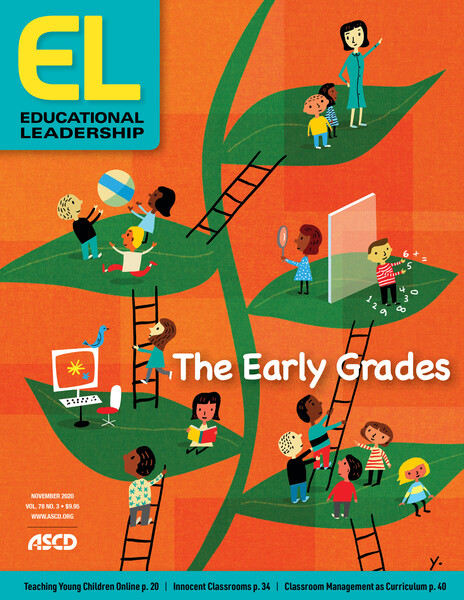My son started 3rd grade this year in a full-time remote learning environment. He's been a good sport about it, but when he stood up on the first day in his bedroom all alone and started saying the pledge of allegiance, I burst into tears.
I wasn't the only one going through the feels. In a text message, a parent friend confessed that her kindergartener refused to show anything but the very top corner of his forehead on camera. Another sent photos of her daughter in preschool, standing at an outdoor art station 10 feet away from her classmates. And a neighbor teaching 2nd grade remotely confessed that it keeps her up at night knowing she can't hug her students who are frustrated or scared.
The pandemic has made things hard on kids, hard on parents, and hard on teachers. Add to that the many social issues we are facing this year, including heightened racial tensions, unemployment, and natural disasters, and it's a scary time for everyone, but especially for the kiddos. Our youngest learners should be running and playing with their peers, engaging in hands-on learning, and having very loud lunchtime conversations. Teachers everywhere have had to adjust to teaching remotely or with new health measures in place—and as a result, play has in most cases suffered.
"Learning is inherently social," says Wendy Ostroff in her article in this issue of EL, and any way we can make distance learning more social "is a win." While this poses challenges, she writes, it also opens up new ways to engage young children and improve learning: "Thrust into a new reality, we now have the opportunity rethink both how we have been teaching and learning, and how we want to teach and learn." Although we selected the topic of early-grade learning for this issue before COVID-19 hit, I saw in reading through the articles just how timely it is. Now more than ever, teachers need help navigating the unique challenges of educating early learners, providing them with a strong foundation that will carry through the rest of their schooling, supporting them in a safe and nurturing environment, and ensuring that they develop a positive identity.
That idea of care and support runs through many of the articles here. Teacher Justin Minkel reminds us that one of the "greatest gifts we can provide our students is simply being there." Alexs Pate discusses the crucial work of ensuring that children of color are not burdened by the weight of stereotypes. And in a Turn and Talk interview, Tabatha Rosproy—the first early childhood educator to be named a National Teacher of the Year—emphasizes that, especially now, we need to "take care of our kids' hearts." We know that the early grades are a time of rapid learning. Students are not only acquiring math and reading and writing skills, but they are also learning how to manage their emotions, interact with others, and be good citizens. This is hard work, but as Carla Shalaby says in her thought-provoking piece about the role of justice and care in classroom management, "Young children can—and do—welcome hard work." The first few weeks of virtual learning were bumpy for my son. There were moments of frustration and fear, technical difficulties, and sadness. But I also heard giggling coming from his room. I saw him excited about a story he was drafting and proud about a math problem he solved. They say our youngest learners are resilient, and I keep thinking perhaps we can turn to them as examples during this time of stress and unease. As Shalaby explains, "Children are powerful people—we need them to help solve problems of care that continue to stump us as adults."
Reflect & Discuss
➛ Is play for early learners a priority at your school? How has that changed since the pandemic?
➛ What are your best ideas for incorporating social activities into your remote learning lesson plans?
➛ What passions, projects, or ideas of your own can you share with students to make them excited about learning?
➛ What do you generally do when a reader you're helping gets stuck on a word?
➛ Do you often feel unsure of the best way to help a reader stuck on a word? What have you learned from this article that will help you respond more effectively?
➛ How have you seen harmful stereotypes shape your students' perceptions of themselves?
➛ After reading Pate's article, how might you approach relationship building differently?
➛ Do your current classroom management practices allow children to practice collective care? If not, how could they be altered to do so?
➛ What does a classroom management curriculum of collective care look like for those engaged in virtual or hybrid learning?
➛ How might you teach children to understand the difference between care and kindness, and the political relationship between care and justice?
➛ How have you seen students' emotions affect the ways in which they learn and behave in the classroom?
➛ Which of the three strategies for supporting emotional regulation in the early-childhood classroom might you start implementing first? How do you plan to do so?
➛ What is the current policy for early identification and intervention in your school or district? How could you advocate for changes?
➛ How might you adopt the three mindsets Morin mentions as key to supporting students with learning disabilities?
➛ How could special education and general education teachers work together to better address early reading and math issues?






